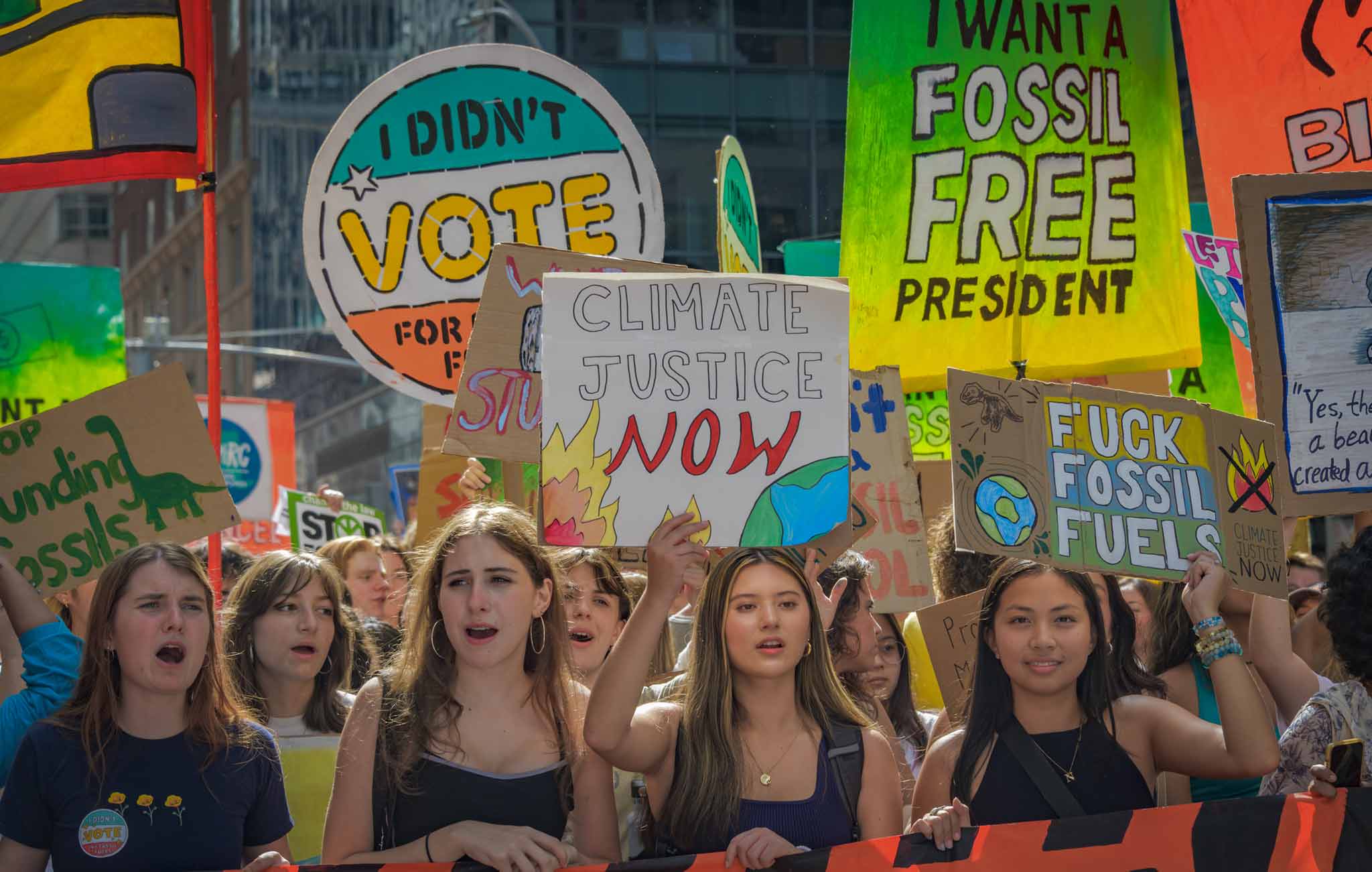Climate Week NYC started with a bang this year as tens of thousands of people took to the streets of New York to pressure world leaders to end the use of fossil fuels. As the climate crisis accelerates, and the public’s outcry grows more insistent, the US’s paper of record met the moment: On Monday, The New York Times covered the demonstration with the seriousness it deserved, laying out the stakes of the climate crisis for readers, examining how protesters’ strategic focus has shifted, and contextualizing the scale of this protest. The Times splashed the feature image across four columns on page A1 of its print edition, with a substantive story inside the paper, providing an excellent example of what Covering Climate Now has long suggested: We journalists should treat activists as newsmakers, covering them like we do politicians or CEOs — accurately, fairly, and above all not ignoring them.
This Times coverage would have been unimaginable just a few short years ago. So, what’s changed? A tremendous amount: Before the UN General Assembly in 2019, Greta Thunberg’s Friday for Future protests helped rally six million people into the streets, raising awareness of climate change globally. The media’s “climate silence” began to break, as newsroom leaders, like their government and business counterparts, began to realize that climate was not a niche concern but an urgent, all-encompassing global crisis. Increasingly dire warnings from the scientists of the UN’s Intergovernmental Panel on Climate Change spurred further awareness, reinforced by a seemingly endless series of record breaking heat, fire, floods, and other extreme weather and the human suffering they brought.
News coverage still has plenty of room for improvement, but there’s no question that climate journalism has made great strides over the last four years. This week, CCNow announced the winners of our third annual journalism awards, a roster of excellent stories from trail-blazing journalists around the world who are pushing the beat forward. If you want inspiration for how to cover the climate story in ways that drive attention and impact while highlighting justice and solutions, browse the winners.
What else can we in the media be doing to take our climate coverage to the next level? “The broad, general public needs to understand what is happening, why it matters, and, above all, that they can fix it — for example, by voting, by not buying unsustainable products, and by talking to friends and family about doing the same,” wrote CCNow co-founders Mark Hertsgaard and Kyle Pope this week. Their call-to-action, with less than 10 weeks to go before COP28, is a call for journalism to fulfill its foundational principle: Equip the public with the information they need to make educated decisions about their governance.
Toward that end, we invite journalists everywhere to join us this Thursday and Friday for “Climate Changes Everything: Creating a Blueprint for Media Transformation,” a two-day, live-streamed conference, co-hosted by Covering Climate Now; our co-founders, Columbia Journalism Review and The Nation; our lead media partner, the Guardian; and Solutions Journalism Network. We’ll be sharing best practices from some of the world’s top climate journalists that all of us can learn from and emulate. And we’ll be devising strategies to enable all of our colleagues throughout the world media to meet this urgent moment in the climate crisis by arming people everywhere with the power that knowledge gives.
From Us
Attend virtually. Tune in tomorrow, Sept. 21, and Friday, Sept. 22, for the two-day conference “Climate Changes Everything: Creating a Blueprint for Media Transformation” being held at Columbia Journalism School in New York City. Check out the conference speakers and agenda, which includes special guest interviews with White House National Climate Advisor Ali Zaidi and former UNFCCC Executive Secretary Christiana Figueres. Register to attend via the livestream.
Everything, everywhere. CCNow co-founders Mark Hertsgaard and Kyle Pope reflect on the state of climate journalism and why “climate change needs to be thought of not as a beat, but as a through line involving everything we do.” Read it at Columbia Journalism Review.
CCNow award winners! Congratulations to the winners of the 2023 Covering Climate Now Journalism Awards, selected from nearly 1,100 entries. See who won. Media colleagues have been showcasing the award winners. See coverage at the Guardian, The Weather Channel, WNYC’s Brian Lehrer Show (and WNYC.org too), THIRTEEN MetroFocus, and Up2Us — and tune into Climate One this weekend for interviews with Naomi Klein and Carolyn Beeler.
Noteworthy Stories
Fossil fuel protests. Amid a backdrop of global climate demonstrations, tens of thousands of protestors, as diverse as the city itself, took to the streets of New York urging world leaders to stop new drilling for fossil fuels. “I’m here today because we need to stop the extraction of Mother Earth and the natural resources for greed and for billionaires and corporations across the world,” said Indigenous activist Brenna Two Bears. By Somini Sengupta, Hilary Howard, and Delger Erdenesanaa at The New York Times…
Legal problems. California has filed a lawsuit against Exxon Mobil, Shell, Chevron, ConocoPhillips, BP, and the industry’s trade association, the American Petroleum Institute, claiming they deceived the public by downplaying the risks of fossil fuels and that their actions have caused tens of billions of dollars in damages. California governor Gavin Newsom urged the companies’ heads to “talk to your kids about how you’re responding [to the lawsuit].” By the Associated Press via the Guardian…
- The Center for Climate Integrity tracks US climate lawsuits against fossil fuel companies.
Triumphs and challenges. The US Inflation Reduction Act has spurred significant clean energy investments in the US state of Colorado, attracting foreign manufacturing giants and creating thousands of high-wage clean energy jobs. But roadblocks, including local opposition, labor shortages, bureaucratic hurdles, and supply chain issues, are slowing down renewable energy projects. By Jennifer Oldham at Capital + Main…
Climate and Libya. Climate change made the heavy rainfall in Libya last week, which led to the deaths of at least 11,000 people, up to 50 times more likely and led to 50% more rainfall, according to a new World Weather Attribution study. Other factors that contributed to the catastrophe include political instability, poor maintenance of dams, and poor construction practices. By Riham Alkousaa at Reuters…
Resources & Events
“Faster than FOIA.” The National Press Club Journalism Institute held a workshop with award-winning investigator Caryn Baird on how to conduct public records research online. Watch here.
Climate reporting (en español). Climate Tracker’s event “How is Climate Journalism Progressing in Latin America and the Caribbean?” will feature five journalists talking about their climate reporting experiences. September 27. More info.
Jobs, Etc.
Jobs. The China Global South Project is looking for a freelance copy editor with a background in African climate issues. Lighthouse Reports is recruiting a data reporter. Inside Climate News is hiring a senior editor.
Freelance. CLIMÁTICA, a Spanish magazine specialized in climate change and biodiversity, is looking for freelance journalists who plan to attend COP28 and can report in Spanish or English. Interested? Email Eduardo Robaina: erobayna@lamarea.com.
Fellowship. Applications to participate in the Reuters Institute’s six-month climate journalism fellowship, the Oxford Climate Journalism Network, are now open. Journalists from every beat, from everywhere in the world, are encouraged to apply. The deadline is October 2. Learn more.


